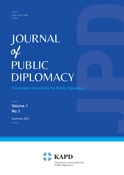

- P-ISSN
- E-ISSN2765-768X
- Frequency By-annually
- PublisherJournal of Public Diplomacy
- CCL
- Indexed by
You can use ACOMS+ service with an AccessON integrated member account.
※ If you are already an AccessON integrated member, go back to the journal’s website and login.

